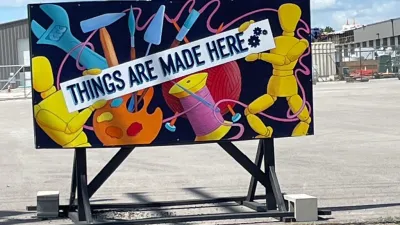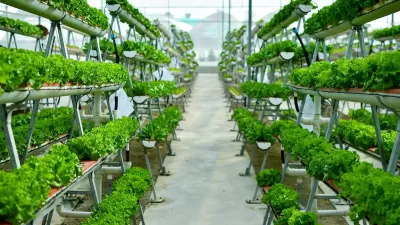Waste management and composting take an entrepreneurial twist through Cleveland millennials' burgeoning home-grown business.
Quietly, composting has been gaining prevalence across the United States. Historically something of a fringe practice exclusive to the agriculturally minded, composting refers to transitioning organic matter into a nutrient rich fertilizer instead of landfill fodder. A young organization, aptly named “Rust Belt Riders,” is leading the push for more composting (and correspondingly, less waste) across greater Cleveland.
Founders Dan Brown and Michael Robinson initiated fundraising for their startup 2 years ago, and first began offering a compost pick-up service via bicycle in June 2014. Combining their personal goals of offering a new environmentally oriented service to Cleveland and influencing cultural attitudes around food waste, Rust Belt Riders have had an exciting first year.
The two gained attention for their idea by participating in the Enterprise Foundation’s Nurture an Idea competition. Although they ultimately did not win the challenge, they were able to garner enthusiasm (and some helpful launch funds) through their participation. Within a year they found themselves recognized for “Best Waste Removal” by Cleveland Magazine, and a featured cover story in Pressure Life Magazine.
All of this attention was helpful in their decision to work with the SEA Change business incubator – which resulted in the organization earning $20,000 in award funds. Fortunately for the Riders, these funds coincided with an uptick in service demand, warranting and enabling the purchase of a van; drastically increasing capacity for pickups.
Taking Care of Business
In discussions with the 2 co-founders, their entrepreneurial spirit is hard to miss. They are quick to deny any glamorous profiling of their business, “essentially, we are garbage men. We provide a waste management service,” states Robinson. While one might not see huge opportunities in garbage collection, Rust Belt Riders deserve recognition for identifying a service shortfall and responding energetically as social entrepreneurs.
Although area consumers’ discarded banana peels or eggshells may seem far from a hot commodity, Dan and Michael have been able to carve out their own niche in Cleveland “waste” management – thus enabling the organization to sustain itself economically. In fact, it’s growing – having recently hired a third permanent staff member.
“A big part of what we’re doing has to do with re-framing how people view waste,” Brown said. “In the United States, around 40% of grown food eventually finds its way to a landfill… which in our eyes is preventable waste. In fact, its really a resource.”
Since beginning operations, Rust Belt Riders have seen their customer base shift from residential subscribers to purely commercial. While locally owned restaurants and retailers compose the current bulk of clients, the Riders have been able to harness growing consumer awareness about food – specifically, where it comes from and how far it travels between farm and table. Evidence can be seen in some of their first adopters – Spice Kitchen & Bar, Beet Jar Juicery and Nature’s Bin grocery – each have weekly pickups, and have also grown their own businesses through encouraging healthy food practices.
Starting with smaller, local businesses has been critical to Rust Belt Riders’ growth, Brown said. Arguably, a true cultural shift won’t be complete until larger chains also recognize the value proposition of composting. “It would be great to get, say, a Subway or Jimmy Johns on board,” Robinson said, as the bulk of landfill-bound (and thus, preventable) food waste currently comes from similar large retailers and grocery chains.
While both founders admit reaching such a milestone will require patience and dedication, there are definitely encouraging signs. Discussions are underway with some of Cleveland’s larger organizations, with possible agreements developing for Rust Belt Riders between local hospitals and educational institutions.
Governmental Role?
While composting legislation does not currently exist in Ohio, several other states have drastically reduced landfill contributions by developing new policy. Some examples include Massachusetts, which requires high-waste businesses (those creating over 2000 lbs per week) to adopt a “food waste diversion strategy,” like composting. Vermont is planning for a full ban on landfill contributions by 2020. The City of Seattle also has mandatory composting.
Brown foresees waste management tactics becoming an increasing part of our national dialog. As landfills fill up, people, cities and our dominant culture will eventually have to adjust. By updating our perceptions on waste, we may create both new revenue streams and resources, all while turning “trash” into “treasure.”
For more information on composting in Cleveland, visit Rust Belt Riders online or learn more about the Rid-All Green Partnership. To find a composting facility near you, visit FindAComposter.com.
FULL STORY: 'Rust Belt Riders' Grow New Composting Service in Cleveland

Alabama: Trump Terminates Settlements for Black Communities Harmed By Raw Sewage
Trump deemed the landmark civil rights agreement “illegal DEI and environmental justice policy.”

Planetizen Federal Action Tracker
A weekly monitor of how Trump’s orders and actions are impacting planners and planning in America.

Why Should We Subsidize Public Transportation?
Many public transit agencies face financial stress due to rising costs, declining fare revenue, and declining subsidies. Transit advocates must provide a strong business case for increasing public transit funding.

Understanding Road Diets
An explainer from Momentum highlights the advantages of reducing vehicle lanes in favor of more bike, transit, and pedestrian infrastructure.

New California Law Regulates Warehouse Pollution
A new law tightens building and emissions regulations for large distribution warehouses to mitigate air pollution and traffic in surrounding communities.

Phoenix Announces Opening Date for Light Rail Extension
The South Central extension will connect South Phoenix to downtown and other major hubs starting on June 7.
Urban Design for Planners 1: Software Tools
This six-course series explores essential urban design concepts using open source software and equips planners with the tools they need to participate fully in the urban design process.
Planning for Universal Design
Learn the tools for implementing Universal Design in planning regulations.
Caltrans
Smith Gee Studio
Institute for Housing and Urban Development Studies (IHS)
City of Grandview
Harvard GSD Executive Education
Toledo-Lucas County Plan Commissions
Salt Lake City
NYU Wagner Graduate School of Public Service




























